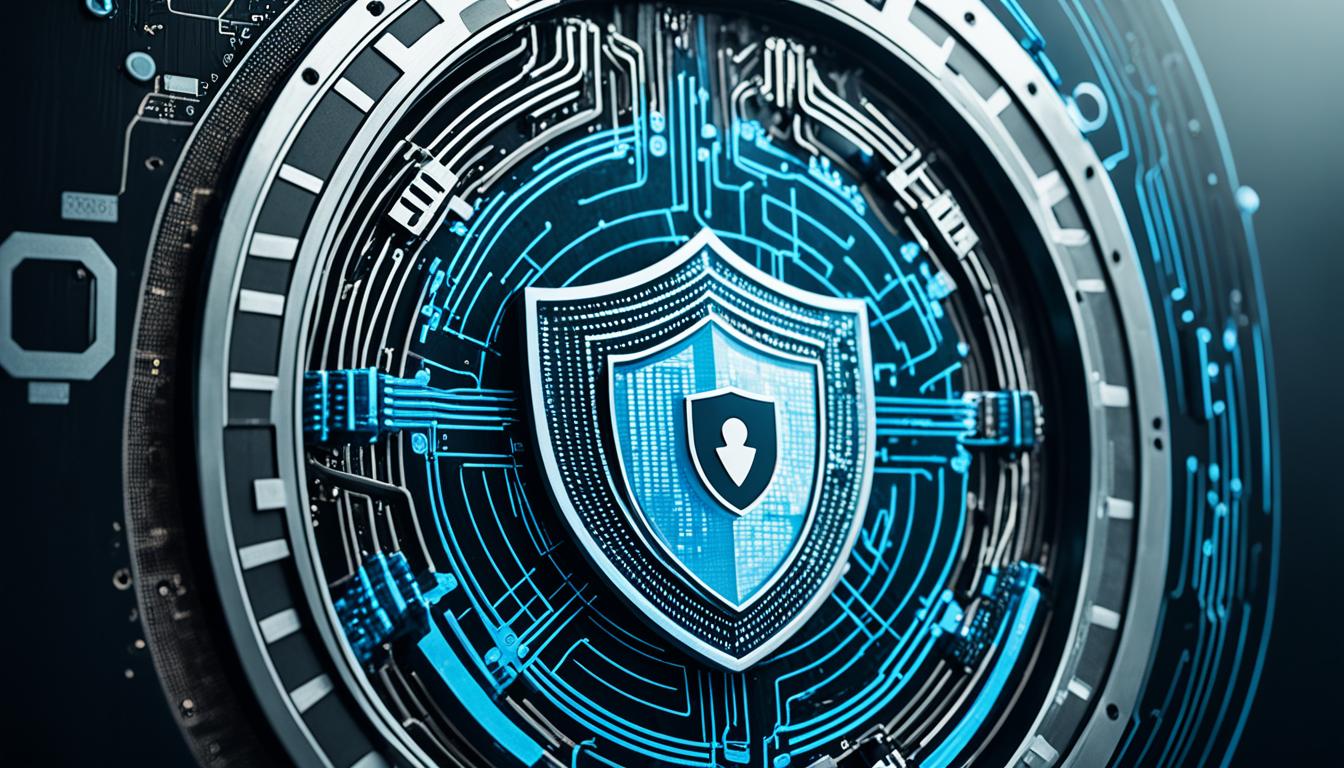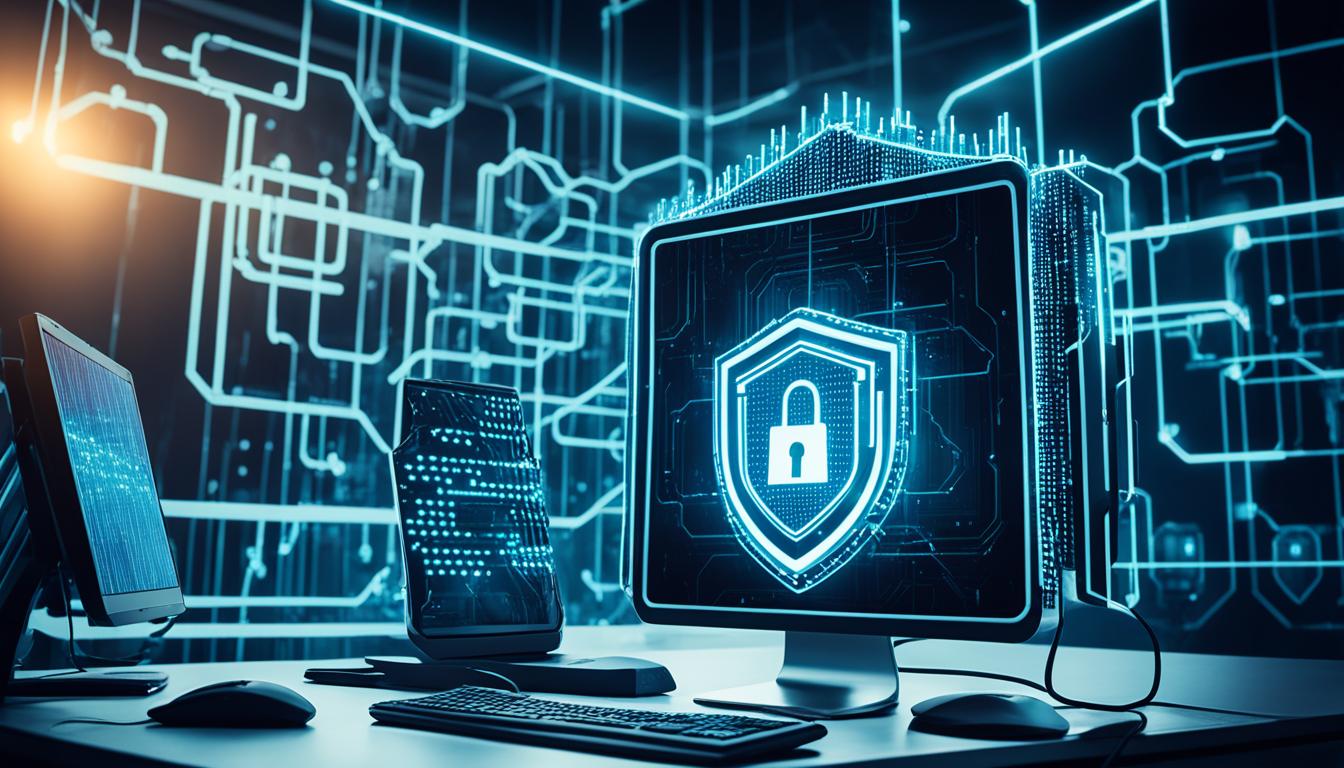Cybersecurity is crucial in our tech-driven world. As companies use advanced tech more, the danger from cyber threats grows. Its main job is to protect digital assets, like computer systems, from attacks. This includes making sure networks, applications, and data are secure. This protects key systems, prevents attacks, and keeps important data safe. Cybersecurity follows rules and helps handle cyber challenges.
This article looks at cybersecurity and how it keeps your digital stuff safe. You’ll learn about different security types and how they protect crucial systems and important data. We’ll cover why cybersecurity is key today. Also, we’ll talk about how businesses can keep up with laws and protect themselves before issues arise.
Key Takeaways:
- Cybersecurity is essential to protect digital assets in today’s tech-driven world.
- Various types of cybersecurity measures protect against different types of cyber threats.
- Cybersecurity plays a significant role in safeguarding critical infrastructure.
- Protecting sensitive data is a crucial aspect of cybersecurity.
- Cybersecurity helps businesses comply with regulations and legal obligations.
Types of Cybersecurity and Their Role in Protecting Digital Assets
In today’s world, our digital information is more important than ever. Cybersecurity plays a huge role in keeping this data safe from threats online. It involves many security methods that work together to keep our information private and usable.
Network Security
Network security is key in keeping computer networks safe from unauthorized access. It uses tools like firewalls and VPNs to stop malicious attacks. These steps are vital in protecting networks from harm.
Application Security
Application security focuses on making sure apps are safe from cyber attacks. It uses secure coding and regular checks to find and fix app weaknesses. This is important as apps are often how attackers get in.
Information or Data Security
Data security aims to keep sensitive information safe. It uses encryption and access limits to protect data everywhere. By knowing what information is most important, it can be kept from the wrong hands.
Cloud Security
Cloud security is crucial as more data moves to the cloud. It includes strong logins and watching for any strange activities. Cloud providers also work to keep the cloud safe for their users.

Mobile Security
More and more, we rely on phones and tablets, making mobile security a big deal. It’s about keeping these devices and the data on them safe. Setting strong passwords and using management tools can help.
Endpoint Security
Endpoint security aims to protect devices like laptops and phones from cyber threats. It uses antivirus and updates to keep devices safe. Ensuring these devices are always secure is very important.
Critical Infrastructure Security
Critical infrastructure security is about keeping important systems like healthcare and transport safe from cyber threats. It’s vital to the function of our society. Access limits and constant checks help to ensure this safety.
Understanding these types of cybersecurity helps in keeping our digital world safe. With the right security in place and staying alert, risks of cyber attacks drop. This protects our important information from those who would misuse it.
The Significance of Cybersecurity in Protecting Critical Infrastructure
Cybersecurity is key to keeping critical infrastructure safe. Things like healthcare and communication need reliable tech. So, we must protect these systems to keep necessary services running smoothly.
Measures against cyber threats are used to stop or reduce their impact. Power plants, transport, and banks are at risk. E.g., a cyber attack on a power grid can be risky, hurting public safety and our country’s safety. With good cybersecurity, these essential services can be made more secure.
Different cyber threats exist, like ransomware and phishing. They can halt essential services, steal data, and cause big money losses. If not defended well, vital services become weak against these dangers. This could threaten the stability of necessary services.
In 2015, hackers hit Ukraine’s power grid, cutting power to many. This event made clear the need for strong cyber defenses. It told the world: “Protect critical tech.” Governments and companies must beef up their cybersecurity. They need to guard critical systems better.
“Keeping critical infrastructure safe is vital. It needs a full plan, with smart threat checks and quick responses.” – Jane Smith, Cybersecurity Expert
Those in charge of critical tech must focus on cybersecurity. They should follow the best standards, check security often, and teach staff to spot and handle cyber threats. By doing this, they can avoid new dangers and beat cybercriminals at their game.

The Importance of Cybersecurity in Protecting Sensitive Data
Cybersecurity is vital in today’s world of digital data. As our digital lives grow, so do the risks. Cybercriminals target valuable data more than ever.
To keep personal, financial, and creative info safe, we need strong cybersecurity. This includes encrypting data and controlling who can see it. Secure methods for logging in and protecting data are also critical.
Organizations use encryption to keep sensitive info private and secure. Data is scrambled and can only be read if you have the code to unscramble it. This means even if someone unauthorized gets the data, they can’t use it.
Limiting who can see data helps keep it safe. Setting up strong password rules and checks like fingerprint scanning are important. They stop people without clearance from seeing or using private info.
On top of encryption, you need ways to make sure the right people are using the data. Biometric scans make sure only the right people can open secure files. This adds a strong layer of protection.
Following good data protection rules is also key. Making copies of data, storing it safely, and properly deleting old files matters. And having a plan to deal with cyber attacks fast is crucial.
Focusing on cybersecurity helps keep digital assets safe. It also builds trust with customers and partners. As we use and share more digital info, staying secure is more important than ever.
The Role of Cybersecurity in Compliance and Legal Obligations
Many fields have strict rules about protecting data and staying safe online. If these laws are broken, big trouble could follow. This makes cybersecurity important for following the rules.
Good cybersecurity keeps important data safe, shields people’s privacy, and cuts the chance of law problems. Sticking to laws like HIPAA and GDPR is a must where private data is handled. So, strong cybersecurity is key to keeping up with these rules and steering clear of legal issues.
Cybersecurity does more than just guard against thieves online. It also shields secrets, money records, and other treasures. To keep these safe, companies need tight security in place. This stops bad guys from getting in and avoids breaking laws.
But, threats can come from inside a company too. Staff might make mistakes that harm security and break rules. Training and rules can teach everyone how to protect secrets and follow the law.
Knowing and following the right laws is essential for any business. Keeping up with rules like the NIST Cybersecurity Framework shows a real effort to protect data and meet legal duties.
“Cybersecurity is not an option; it is a responsibility that businesses must shoulder to protect their digital assets and maintain trust with their stakeholders.”
Organizations must keep their digital defenses strong. They should always check for new risks and law changes. Audits, tests, and risk checks help find weak points and make sure everything is legal.
So, putting money into cybersecurity is both smart and necessary. It keeps data safe and earns trust from those you work with. With the right steps, companies can keep on the right side of the law and avoid trouble.

Conclusion
Cybersecurity is crucial in the digital age, keeping digital assets safe. As we rely more on technology, both people and groups need to make it a top priority. This helps protect their computer systems, networks, and important data.
It is key for keeping vital infrastructure safe, stopping cyber attacks, and making the world more secure. Strong cybersecurity means less financial harm, more privacy, and a better trust and reputation.
Also, it helps follow the law and meet regulations. Effective cybersecurity makes sure businesses stand up to industry rules. This protects them from harm to their reputation and from legal trouble.
Today, threats to our online safety are always changing. It’s crucial to know how important cybersecurity is. Everyone and every group should take action to keep their digital areas safe. This way, they can deal better with digital problems.
FAQ
What is cybersecurity?
Cybersecurity protects digital assets like computer systems from online attacks.
What are the different types of cybersecurity?
There are several kinds of cybersecurity. These include network, application, and information security. Also, there’s cloud, mobile, endpoint, and critical infrastructure security.
What is the role of cybersecurity in protecting digital assets?
Its role is critical. Cybersecurity stops unauthorized access, maintains data integrity, and fights cyber threats. Without it, our digital world would be at risk.
Why is cybersecurity important in protecting critical infrastructure?
It’s vital because essential services rely on secure computer systems. Cybersecurity prevents attacks that can disrupt healthcare or communication systems.
How does cybersecurity protect sensitive data?
By using encryption and access controls, cybersecurity keeps data safe. It protects against unauthorized access, keeping personal and sensitive data secure.
What is the role of cybersecurity in compliance and legal obligations?
It ensures that businesses meet data protection laws. With good cybersecurity, sensitive information stays safe. This reduces the risk of facing legal problems.